Two Father Figures Who Shaped ‘The Flash’
The CW series The Flash, whose first season finished in May, has helped restore good supportive fathers to television.
While many media portrayals still focus on dumb, debased and dysfunctional dads, The Flash took a surprisingly different course by telling the story of a character that was powered as much by the love of two fathers as he was by the Speed Force.
From dumb to dysfunctional
Once this concept seemed impossible. For several decades, television’s portrayals of fathers have tended to be negative: bullies like Archie Bunker, buffoons like Chester Riley and Homer Simpson, and nameless, absent dads whose past abuses cast dark shadows over the lives of their children.
This seems to be especially true in fantasy and science fiction, in which the number of characters with absent, dead, or abusive fathers is stunning:
- In Star Trek: The Next Generation, Captain Jean-Luc Picard became a Starfleet officer over the objection of his backward and old-fashioned father.
- In 1980s Marvel Comics, Jennifer Walters (She-hulk) began a downward spiral into violence and immersing herself in the power of She-hulk in the comics, early in her run due to an overbearing and emotionally distant father.
This trend is also seen in Russell T. Davies’ revival of Doctor Who. The most positive portrayal of a father, in the Series 1 Episode “Father’s Day,” has Rose save her dad, Pete, in 1987. But this sets off a paradox that threatened to destroy the planet and is only resolved when Pete allows himself to be hit by the car and restores history. Even in this episode we learn Pete is a flirt who is unreliable and irresponsible. He states that if he had lived, he would have let Rose down time and time again, and we’re given little reason to disbelieve it.
Series 2 featured “The Idiot’s Lantern,” with an abusive and controlling father who lords over his wife and children in 1952; and “Fear Her,” in which a girl is traumatized by her memory of her sexually abusive father–which serves as a fodder for an alien invasion.
Series 3 featured Martha Jones’ father, whose tasteless flaunting of his new girlfriend and whose trashy needless fights with his ex-wife show little concern for his kids.
Not every negative portrayal of a father shows him to be a bad person. Sometimes, he is simply unsupportive.
In Star Wars, Luke Skywalker had the ultimate bad dad in Darth Vader. But he was also raised by Uncle Owen, whose efforts to shelter Luke and keep him safe from the sort of horror his dad had suffered leave Luke a frustrated young man who keeps getting put off by promises that he can go to the Academy next season. Were it not for stormtroopers who destroy his aunt and uncle’s farm, Luke could have spent the rest of his life waiting for a chance that never came.
Fathers and ‘The Flash’ (1990s)
In a similar way, in the 1990 TV series The Flash, Henry Allen is a retired police officer. Barry’s older brother Jay is killed by his former partner. Barry secretly developed the powers of The Flash, and in a heartbreaking scene, he comes to ask for Dad’s blessing to find his brother’s killer (though without revealing his powers). But his dad denies the blessing and shoots him down: “Well, I can’t, Barry. You’re all we’ve got left.”
The words and the delivery assure us that Henry loves his son, but he has no confidence in him whatsoever.
Why are these father relationships so prevalent in science fiction television stories? For some, the reasons may be ideological or part of a tradition of attacking authority. For most, the reasons probably reflect personal dynamics of the writers, the people they know, and their target audience–especially as the number of children being raised without any father continues to grow. So many people know the pain of absent, abusive, irresponsible, overbearing, and discouraging fathers, and therefore they relate to these portrayals and are led to sympathize with the main characters.
However, such one-sided views of dads can lead to a distorted view of fathers and fatherhood. It tends to suggest fathers are not only unnecessary but harmful.
Awesome dads are back
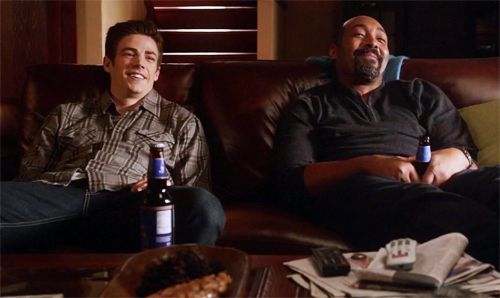
Thankfully, 2010s television has shifted to better portrayals of fathers. Series 6 of Doctor Who had not one but three different episodes that extol the value of a father who loves and respects his children. Series 7 introduced Rory’s Dad, Brian Williams, who was one of the most lovable and positive family members portrayed in all of Doctor Who.
And perhaps the most remarkable series was the latest superhero hit from CW, The Flash. The Henry Allen of this new series has little in common with the crusty retired cop of its 1990s counterpart. In the new The Flash we find portraits of not only one but two loving father figures.
‘The Flash’ father 1: Henry Allen
Barry Allen first appeared as The Flash in a 1956 comic. But the newer scenario of the CW series appeared in 2011 comics with the latest reboot of the DC Universe.
In Flash #0, Barry’s mother was murdered when he was a child and away at a spelling bee. Barry then dedicated his life to finding evidence to prove his dad innocent. In the first pages of the comic, Henry pleads with his son to move on. “I’m imprisoned but you’re the one living like you’re behind bars.” Henry finally tells Barry that he’s guilty just so he’ll move on with his life, though Barry sees through this by the end of the issue.
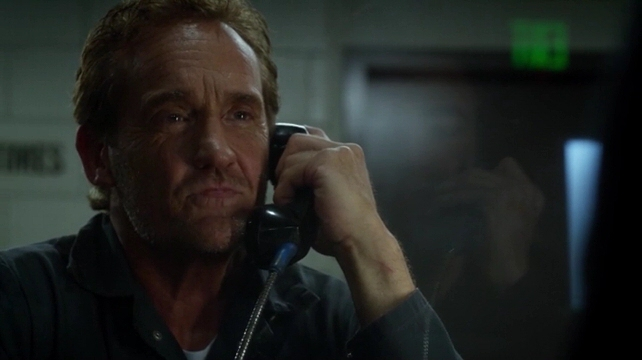 This portrayal proved central to how Henry Allen appears in the TV show. He’s wrongfully imprisoned, but he believes his own situation comes second. Following the idea of the comics, when Barry is a child, Henry asks his old friend, Joe West, stop Barry from coming to see him in prison so Barry can move beyond the tragic death of his mother and live his life. Then without being told, Henry figures out that Barry Allen is the Flash and expresses his pride in his son.
This portrayal proved central to how Henry Allen appears in the TV show. He’s wrongfully imprisoned, but he believes his own situation comes second. Following the idea of the comics, when Barry is a child, Henry asks his old friend, Joe West, stop Barry from coming to see him in prison so Barry can move beyond the tragic death of his mother and live his life. Then without being told, Henry figures out that Barry Allen is the Flash and expresses his pride in his son.
Near the end of The Flash season 1 (beware spoilers), Barry gets the chance to go back in time to stop his mother’s death and prevent his father from being put in prison. But Henry opposes the idea of Barry changing history. Henry feels that tampering with time would also tamper with what had made Barry who he was.
“You’re always a hero, and your mom would be just as proud,” Henry tells his son. “And if she had a say in this, if she thought for one second that you going back to save her would mean losing what makes you so special, she would never want that!”
‘The Flash’ father 2: Joe West
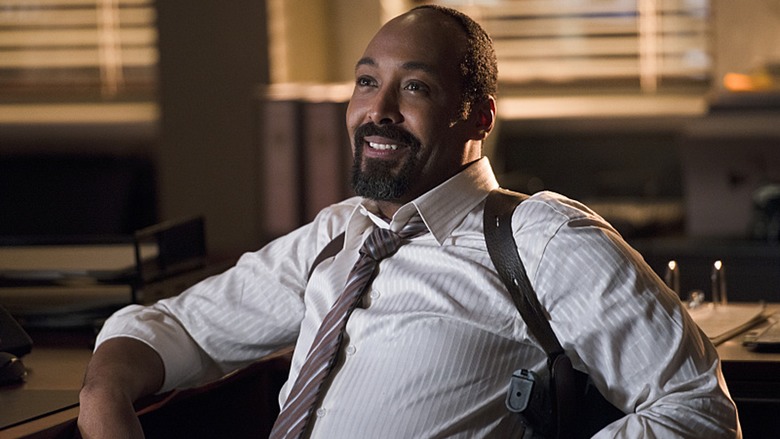 When Henry went to prison, Barry was taken in by Joe West, also a police sergeant, who became like a second father to him.
When Henry went to prison, Barry was taken in by Joe West, also a police sergeant, who became like a second father to him.
Throughout the first season, their relationship deepens as Joe shares Barry’s superhero secret identity. Throughout his life, Joe has tried to be sensitive and to avoid seeming to subvert Henry’s place in Barry’s heart. Yet, we learn when we Barry was in a coma and almost died, Joe refers to him as “my son.” And when given the chance to change history, Barry simply says: “I was born with one father, but that tragedy gave me two.”
In the season 1 finale, “Fast Enough,” the time-traveling Reverse Flash explains he had wanted to kill Barry’s younger self. When that failed, he decided to make the young Barry suffer a tragedy “so horrible, so traumatic” that he would never recover. But ironically, the Reverse Flash’s plan is defeated by the “second father” resulting from that tragedy — Joe West.
Joe was reluctant to take Barry as he was already widower and a single father, but in doing so, he found Barry had an unexpected effect on his family. “I mean, you brightened up everything,” Joe says. “You’ve seen more darkness than any man will in a lifetime and you never let it dim your soul. So there I was thinking that I’m changing your life by taking you in, but the truth is, you changed mine.”
At the same time, Joe is willing to challenge Barry and tell him when he’s wrong, but in a way that respects that he’s an adult. In “Rogue Air,” Barry asks Captain Cold to help transfer four metahumans from Star Labs to one of Oliver Queen’s private islands. Despite Joe’s warnings, Barry trusts Captain Cold and he gets burned.
But after this, though Joe once tells Barry, “I told you so,” Joe only exhorts his adopted son. He calls Barry to be the type of man Joe knows him to be, the type of man Barry proved to be by even caring what happened to these four supervillains. “You know the difference between right and wrong, and you weren’t willing to blur the lines between the two,” Joe says. “That’s the kind of man you are and that’s what makes you different than The Arrow. So, please, no more walks on the dark side.”
In season 1, Joe’s opinion matters to both Barry and Joe’s daughter Iris. When Eddie wants to ask Iris to marry him, he asks for Joe’s blessing first. While Eddie like this is a formality, when Joe declines to give a pre-approval to Eddie’s proposal, Eddie all but breaks out into his own version of the song “Rude,” as he knows Joe’s blessing would help assure a “yes” from Iris.
Joe’s opinion isn’t important to the lives of the children he raised because he controls every aspect of their life but because he’s built relationships and trust with them. His reason for refusing to bless Eddie’s planned proposal was not a power play but because he knew Barry and Iris and knew that she really loved Barry.
Of course, Joe’s influence could be both for good and bad. Joe’s opposition to Iris knowing Barry’s secret identity was the only reason Barry kept it from her. And this led to a lot of tension and jeopardized that trust, but didn’t destroy it because good relationships have enough room for forgiveness and are strong enough to survive errors.
While Henry would stand to be the biggest winner if Barry changed the past, Joe would stand to be the biggest loser as he would not get to raise Barry. Despite this, his advice was for Barry to go for it, to change the past so he would grow up with both parents. “You saved a lot of people’s lives this past year. Now it’s time to save yours.”
Joe and Henry aren’t perfect, but they give dads and men who want to be dads a lot of food for thought. In them, we have a picture of two courageous fathers willing to sacrifice what’s for their best for them for the best of their children. In Joe, we see a man who has invested himself deeply in his children. Both paint a picture of fatherhood that shows how much of a blessing a good father can be.


































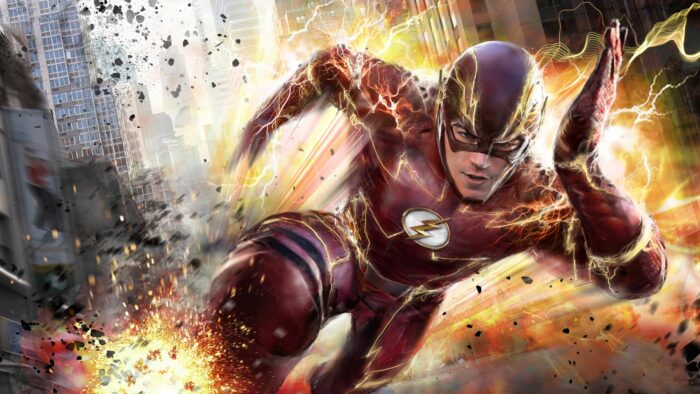
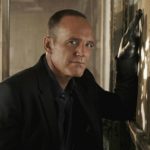
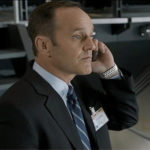






There’s a joke in here somewhere, about how a lot of people get riled up over someone having two dads.
We really enjoyed The Flash. I’m liking it better than Arrow (partly cause I am sooo tired of the flashbacks!!) But the fatherly element has been one of the best and most pleasantly surprising aspects. And, of course, the friendship/family aspects of both shows.